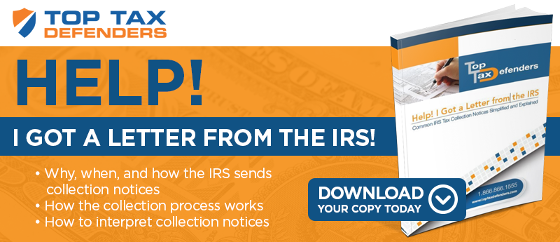
The IRS uses a variety of collection activities to collect what taxpayers owe to the government. Among these tactics, a federal tax lien can be among the most difficult with which to cope.
It can negatively impact your finances, credit rating, and employment prospects. Rather than risk your future because of taxes that you owe, you can use these suggestions for avoiding a federal tax lien.
About Tax Liens
A tax lien is a hold that the IRS places on your available assets. It is put in place whenever you owe an outstanding debt to the IRS and you have not done anything to resolve the debt or pay it in a timely manner.
A tax lien can be particularly devastating because it can affect your credit report, property value, and your ability to secure new credit. You also may lose access to the money in your own bank account.
Further, a tax lien cannot be dismissed or forgiven by filing for bankruptcy. If anything, the IRS becomes the primary creditor seeking repayment from you and will keep the lien in place until the tax debt is paid in full. For some people, this could take years before the tax lien is released.
How a Tax Lien Can Affect You
When the IRS implements a tax lien, it freezes your assets and credit. You cannot get new credit while an IRS tax lien is in place. This freezing of your assets can be particularly bad if you are a small business owner and need to secure lines of credit to pay bills, buy inventory, or for other purposes.
Further, a tax lien can be imposed on any liquid asset that you own. Once the lien is issued by the IRS, it become a matter of public record. It is often published in local newspapers, and anyone you know can find out that you have not paid your taxes and are now subject to an IRS tax lien.
The tax lien will also be reported to the three major credit bureaus and show up on your credit report. Likewise, you may not be able to sell any real estate that you own while the lien is in place.
Avoiding a Tax Lien
As serious as a tax lien is, it is also not difficult to avoid in many circumstances. The best way to avoid tax lien is by simply paying what you owe to the IRS. You should file your tax return on time each year and pay any balance that you owe immediately.
If you cannot pay what you owe in full, you should request to be put on a payment plan that will let you pay off your tax debt in monthly increments. This plan is called an installment agreement and allows you to make monthly payments that are based on your current income. The payments are affordable and are put toward both the balance, interest, and any penalties you accrue.
In fact, you cannot escape penalties as well as interest accruing on your tax debt while you are on an installment agreement. However, this plan will allow you to keep your account in good standing with the IRS. As long as you make your payments on time each month, you will avoid having a tax lien put on your assets.
Resolving a Tax Lien
If you do not agree with the tax lien or believe it should not be put on your assets, you have the right to appeal it. Once you are notified in writing of the IRS' intent to implement a tax lien, you have 30 days to request a hearing. During that hearing, you can dispute the lien and the amount of taxes you owe.
You also have the right to hire a tax professional to counsel and represent you during the hearing. If you do not agree with what the IRS says you owe or you believe the tax lien to be unjust, you can hire a tax resolution specialist to help you dispute it in an IRS hearing. If your appeal is successful, the tax lien will be removed from your account.
Repay the Tax Debt in Full
The simplest way to get rid of a tax lien is to pay the tax debt in full. Sometimes this can be impossible, however, because of how much you owe. You may not have the amount of money in your bank account to pay back what you owe to the IRS.
If that is the case, it may be worth looking into other payment options. For example, it may be cheaper for you to use a low-interest credit card to pay your IRS balance. You then would avoid having to make monthly payments to the IRS and instead make low-interest payments on your credit card. Your credit card payments may be much lower than what the IRS would require from you each month.
This option can be particularly helpful if you want to avoid expensive penalties and interest that will accrue on your tax debt the longer you leave it unpaid. Using a credit card to pay what you owe right now spares you from having to pay additional expenses on top of your IRS tax debt.
Apply for an Offer in Compromise
Some taxpayers face extreme financial difficulties when it comes to repaying a tax debt. In this instance, it may be better to make an Offer in Compromise or OIC to resolve your tax debt.
An OIC is an offer to pay your tax debt for less than what you actually owe. It is a settlement to resolve your debt based on what you can realistically afford to pay right now.
An OIC must be reasonable and reflect what you earn as well as to what assets you have access right now. To make an OIC, you must fill out and submit IRS Form 656. A tax professional can help you make an OIC and potentially have it accepted by the IRS to resolve your past due taxes.
Make a Case for Financial Hardship
When you cannot afford to be on an installment agreement, you might make a case for financial hardship. You can request the IRS to evaluate your finances in order to grant you a financial hardship status.
If you qualify for financial hardship, you will be allowed to apply for other payment options like an OIC. In some cases, the IRS will remove a tax lien entirely if a taxpayer faces dire financial circumstances like being homeless or under-employed.
Do Nothing
Your last option regarding your tax debt would be to simply do nothing. However, this is the riskiest option because it opens the possibility of the IRS seizing assets like your:
- Car
- Home
- Bank accounts
- Income
- Retirement savings
It also will result in the tax lien affecting your credit rating. Your tax debt will not go away if you ignore it. It is best if you use one of the available payment or settlement options to resolve what you owe to the IRS.
A tax lien can lead to financial hardships that can follow you for years. Avoiding a tax lien is not difficult in most cases, however. You can resolve what you owe to the government by paying your debt in full, requesting an installment agreement, making an Offer in Compromise, or requesting financial hardship status.




